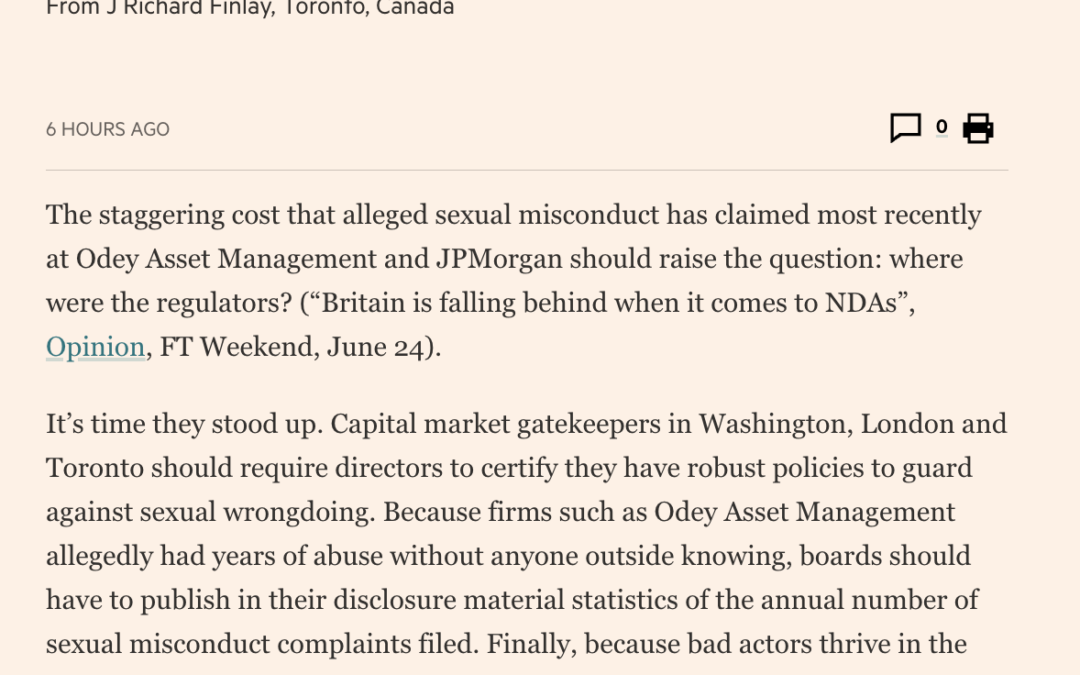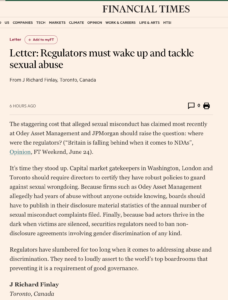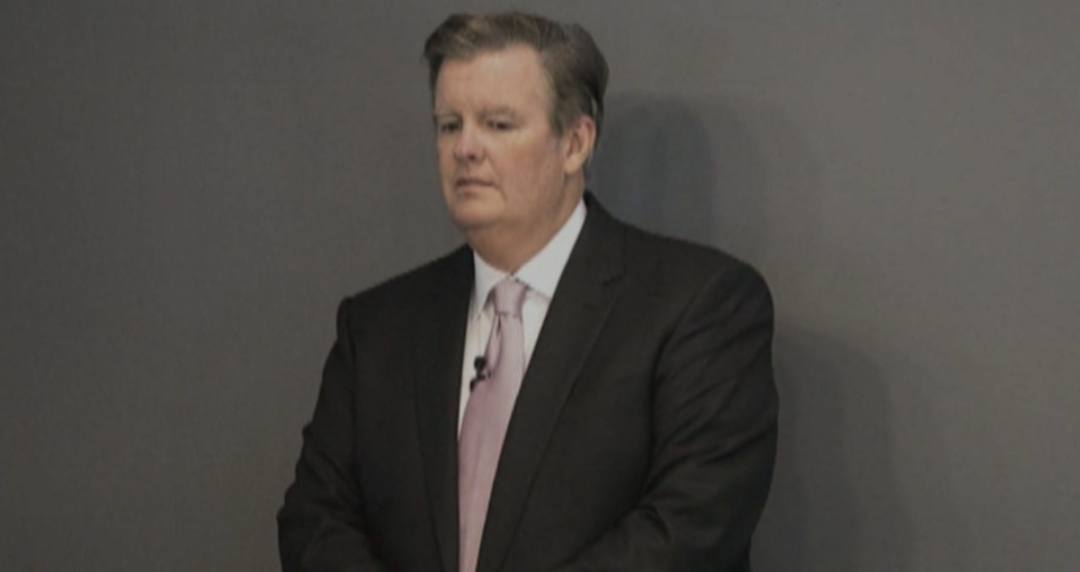
The Financial Times on what regulators need to do to curb sexual misconduct




The return of the CEO as King? Many reports now refer to Mr. Rogers’ board. That’s what they said about J.P. Morgan more than a century ago. Every board was “his” board and every director beholden to him. Has corporate governance progressed so little in the past two decades that this move back to the future produces barely a note of outrage in the business media? One thing is clear: they don’t want a strong voice that is capable of putting this development into its proper perspective. This does not bode well for the state of corporate governance in Canada. I’m hearng that from a lot of everyday investors, and even some smaller professional investors. Admittedly, we don’t have many like Bill Allen, founder of Allenvest back in the 1980s, around anymore.
The decision by the BC court also reveals how out of step that province is with modern boardroom practices and the responsibility of directors to serve the interests of all shareholders, and not just the most powerful.

My late father used to say that thinking about something is best done before you do it. HBC, one of Canada’s oldest companies, would have done well to heed that maxim before it got into a mess involving the exclusion of Indigenous representation on an advisory committee to support to Black, Indigenous and People of Colour in the fashion industry. The company has since offered an apology.
What has always amazed me is the frequent lack of thinking that goes on in major corporate and public institutions, especially when the subject touches on anything to do with ethics or issues of public sensitivity. I’ve seen how things proceed from inside for many decades. It is truly amazing how so many organizations blunder along without the full picture to guide them, and without the benefit of good advice. Assumptions are often made that have no basis in fact and, to be honest, too often those inside underestimate the public and key stakeholders in terms of their interest and knowledge.
Several years ago, I was asked to attend a high-level meeting of a Canadian bank in the midst of merger talks with another giant banking institution. It was full speed ahead, based on the fallacious idea that the federal government had no choice but to allow the merger. “They won’t dare stop us now. We’ve gone too far with our plans” was how one top executive put it. They didn’t want to hear any dissenting voice or one advocating caution in treating the merger as a fait accompli. That’s often a problem with the analysis that goes on at the top. Inconvenient truths find themselves, and their messengers, left out in the cold. It’s not just business where this happens. Many large organizations in the public sector, healthcare, universities and even big charities, have a “thinking” deficit where inside the beltway viewpoints or insider blinkers skew decision-making away from reality and into the minefield of public rancor.
The bank merger was never approved, of course. Those banks are still on their own. They looked pretty stupid when the federal government thundered a big NO to their plans. The executives responsible went on with their lucrative careers without skipping a beat.
The “thinking” that produced that miscalculation, and the mindset that gave rise to it, are still very much alive and well in boardrooms and C suites everywhere, as this latest HBC diversity snag illustrates. The sad thing is that all of these blunders are usually avoidable with, well… a little thinking, and perhaps a bit of sound advice.

Thank you, Martha. You raise an important voice — an ethical voice — on this subject. I’ve been faulting Mayor Tory for his involvement with Rogers, especially at this time. He claims it’s fine — no conflict according to him. Conflict of interest and appropriateness in the actions of public officials doesn’t work that way, Mr. Mayor. It’s about perceptions, and you’re not the one who gets to decide about the appearance of conflict, especially when you’re making huge dollars from that relationship. If Mayor Tory were totally confident about the appropriateness of his role with Rogers, he would long ago have disclosed his compensation. Hiding it leads others to be suspicious. The overriding issue is, and must always be, whether the appearance of such a relationship meets the test of public confidence and trust. Forty years studying, advising and commenting on ethics in the public arena, and around the boardroom table, persuades me this does not.
Rogers does a lot of business with the City of Toronto. Being the mayor of Toronto is already more than a full-time job. There’s no room for a gig like this with a private company like Rogers, and certainly not one that is so highly remunerative. It’s just another wrinkle in a Shakespearean saga that has brought a storied company into disrepute. And now Toronto has to become tainted by it?
Martha’s should not be the only public voice on this subject. The voice of ethical choices is a voice that is too often missing from Canadian boardrooms.

“As of Friday night, it was unclear who exactly is on the board of directors at Rogers…” Toronto Star, October 23, 2021.
[ms_dropcap color=”#000000″ boxed=”” boxed_radius=”8″ class=”” id=””]W[/ms_dropcap]hat an indictment of one of Canada’s most valued public companies and a giant in the country’s telecom industry. It’s a further indictment of a shareholder system in Canada that permits two classes of voting shares, which puts some investors, usually family members, in control of the whole show, leaving everyone else in supporting roles. Independent directors at Rogers cannot allow chaos and uncertainty to be the governance model. They need to quickly assert themselves to ensure stability — or resign. It is also time for some wise people to begin to think about how it was ever allowed to come to this, and what needs to be done in Corporate Canada to prevent similar boardroom disasters.

Why is it not surprising that it has come to this? Rogers – the company — has never been a model of sound corporate governance – far from it. This internal battle right now is a classic symptom of a dysfunctional board in a situation where one family controls the whole show while ordinary investors, and frequently independent directors for that matter, are relegated to bit parts.
One recalls similar internecine battles involving Magna and Canadian Tire, none of which ever topped the list of corporate governance best practices. It’s a shame, too, that at a time when ethical practices in the boardroom are taking centre stage, there’s not a word about the larger role of ethics in this discussion. Smart investors, and certainly informed stakeholders, expect better these days.
Frankly, I fault Canada’s institutional investors for giving their imprimatur to a corporate structure that is about as far away from good governance as you can get, and regulators and market gatekeepers for still permitting these antiquated controlling shareholding contrivances.
And don’t even get me started on how inappropriate it is, from the perspective of good civic governance, if nothing else, for a sitting mayor of Toronto to be insinuating himself into a matter like this. Rogers does a lot of business with the city of Toronto and Tory’s role just opens the door to all kinds of questions and potential conflicts.